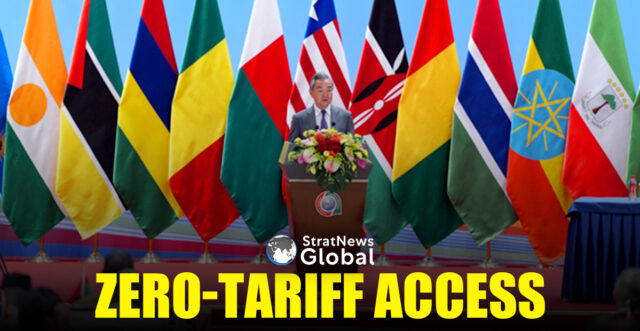China has announced it will lift tariffs on nearly all imports from African countries, excluding only Eswatini, in a significant expansion of its trade policy aimed at strengthening economic ties with the continent.
The move will allow 20 additional African nations, primarily middle-income economies, to access the Chinese market duty-free, opening the doors to the world’s largest consumer market.
The decision was unveiled during a ministerial meeting in Changsha, Hunan province, linked to the Forum on China-Africa Cooperation (FOCAC).
Zero-Tariff Access
The announcement builds on a 2024 FOCAC pledge that granted zero-tariff access to 33 least-developed countries (LDCs), including Ethiopia and Uganda.
Now, China aims to extend this benefit to 53 African nations, maintaining diplomatic ties with Beijing. Eswatini remains the sole exception, due to its continued recognition of Taiwan.
Chinese President Xi Jinping, in a letter addressed to the meeting, expressed China’s readiness to simplify export procedures, enhance customs clearance, and offer inspection and quarantine support.
Additionally, China will provide skills training in Africa to help local producers meet these standards and expand the promotion of African goods in Chinese markets.
Representatives from both China and African nations used the forum to voice criticism of the United States.
They accused Washington of destabilising global trade norms and prioritising unilateral interests over multilateral cooperation.
China’s Foreign Minister Wang Yi said Beijing would continue to open its markets to Africa and offer broader development opportunities.
The move comes at a time when Africa’s trade with China has surged to nearly $300 billion in 2024, dwarfing its $71.6 billion trade with the U.S. Experts say this tariff elimination marks a structural shift in China-Africa trade, correcting past distortions caused by limiting preferential access only to LDCs.
‘Quality Products’
Still, analysts such as Lauren Johnston of the University of Sydney noted the ambiguity around terms like “quality products,” pointing out that African exporters face deeper systemic barriers, such as infrastructure gaps and technical standards, beyond just tariffs.
Trade consultant Hannah Ryder said that while eliminating tariffs is a significant step, exporters still struggle with challenges like logistics, language barriers, and digital trade infrastructure.
However, she said this broader access could help more industrialised African economies diversify beyond raw material exports.
In contrast, the U.S. is scaling back trade benefits under the African Growth and Opportunity Act (AGOA), which is set to expire in September and may not be renewed.
U.S. President Donald Trump had already imposed steep reciprocal tariffs—up to 50%—on African exports, severely impacting their access to the American market.
China’s latest trade outreach is seen as a strategic response to these U.S. moves, aiming to strengthen its influence across the Global South by presenting itself as a consistent and cooperative economic partner.
A joint statement from African ministers and China called on the U.S. to abandon protectionist policies and return to a more equitable and respectful dialogue on trade disputes.
The statement emphasised that unilateralism and economic coercion have hampered Africa’s development and called for increased international support—not cuts—in development assistance to the continent.





